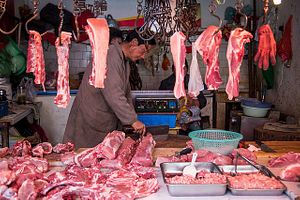Trans-Pacific View author Mercy Kuo regularly engages subject-matter experts, policy practitioners and strategic thinkers across the globe for their diverse insights into the U.S. Asia policy. This conversation with Bruce Friedrich – Co-Founder and Executive Director of The Good Food Institute and co-author of two books, including the forthcoming Clean Protein: The Revolution That Will Reshape Your Body, Boost Your Energy—and Save Our Planet with New York Times bestselling author Kathy Freston – is the 110th in “The Trans-Pacific View Insight Series.”
Briefly explain the significance of China’s trade agreement with Israel worth $300 million to import clean meat produced by three Israeli companies.
To be clear, although the media has reported that the agreement has to do with clean meat, that is not accurate. The agreement is extremely promising for clean meat, but clean meat is not explicitly addressed in the deal.
That said, there is ample reason to be optimistic. China has rolled out a series of policy efforts aimed at reducing greenhouse gas emissions. One of these initiatives is focused on cutting meat consumption in half, while this recent trade agreement is designed to usher in a wave of climate-friendly innovation by partnering with Israeli tech firms. What’s yet to be seen is if these two initiatives will play off of each other; that is, will China use this new trade agreement to bring in food innovation from Israel that directly addressed meat production’s massive carbon footprint?
Currently, there are three Israeli companies that are creating clean meat, which is created in a climate-friendly way by growing meat directly from cells, instead of breeding, raising, or slaughtering any animals. Making Israeli clean meat companies the focus of this new trade agreement would compound the impact of China’s climate action and meat-reduction initiatives.
With $13.5 billion worth of meat imported into China every year, how does this China-Israel deal impact China’s meat consumption?
Importing clean meat to China would not reduce consumption of meat – and surprisingly, that’s the beauty of it! Shifting from conventional meat consumption to clean meat consumption allows consumers to eat the same foods they enjoy, but without the same negative climate impacts. Clean meat can also save governments money on costly meat-reduction marketing campaigns, while simultaneously helping them meet environmental protection goals.
Assess the role of Israeli innovation in clean meat.
Israel has distinguished itself as one of only a handful of countries putting forth an interdisciplinary effort to commercialize production of clean meat. Along with the three companies based there ̶ SuperMeat, Meat the Future and Future Meat Technologies ̶ the country boasts leadership in academia and the NGO space.
Israel is now two years into a groundbreaking study on the feasibility of growing chicken breast, led by Professor Amit Gefen of Tel Aviv University and the Modern Agriculture Foundation, an Israeli organization that functions similarly to The Good Food Institute.
Each of the three Israel-based companies is bringing a unique focus to the task of clean meat production, and together the three showcase Israeli innovation:
- Meat the Future is led by Shulamit Levenberg, a professor of Biomedical Engineering at Technion, Israel Institute of Technology;
- Future Meat Technologies is led by Hebrew University of Jerusalem Prof. Yaakov Nahmias;
- SuperMeat is led by CEO and cofounder Ido Savir, a graduate of the Israel Defense Forces’ high-tech Mamram unit.
How might clean meat technology transform the global meat-production industry?
Clean meat has the potential to fundamentally transform the global meat industry, simply because it is more efficient. As an additional selling point, clean meat is also much better from an environmental and food safety standpoint than meat produced on modern farms. If you look at the global food industry right now, the two biggest questions are: 1) How do we feed 9.7 billion people by 2050; and 2) What do we do about climate change? Clean meat is the answer to both of these questions, and it will have a significant economic advantage over conventional meat production once production scales up. Seeing these benefits, major meat producing companies are taking notice. For instance, the multinational food conglomerate Cargill just invested in the clean meat startup Memphis Meats as a way to ensure it’s on the leading edge of the most efficient meat production method going forward.
Just as the inventions of the plane and car have made the idea of traveling from state to state by horse and buggy inconceivable, so too innovation of clean meat will make raising animals to eat them a thing of the past.
Explain the scale of market opportunity for Israeli meat-technology companies in Asia.
The market opportunity for clean meat in China is tremendous and continues to grow. If all meat consumed in Asia were clean meat, clean meat companies would be serving a massive market while subverting the climate impact of meat production. According to the International Trade Center, Chinese meat imports were valued at more than $10 billion in 2016. This is up from approximately $2 billion in 2010, which gives you an idea about the growth in this market. Reaching the Chinese market with clean meat is an incredible opportunity, both in terms of profit potential and the potential to do good by making the food system more sustainable and climate-friendly.

































